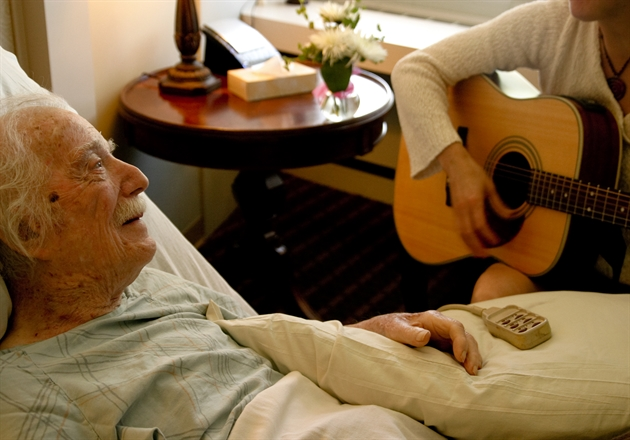The palliative care musical “Night Side Songs” emerges as a groundbreaking exploration of the intersection between theater and illness, offering a heartfelt depiction of life, death, and the human experience. Created by Daniel and Patrick Lazour, this compelling musical delves into the poignant journeys of cancer patients, led by the guidance of renowned palliative care specialist Susan Block. Unlike traditional narratives, “Night Side Songs” invites its audience to grapple with the complexities of end-of-life care, making conversations about serious illness more accessible and relatable. As the show reveals the emotional landscapes of doctors, caregivers, and patients, it shines a light on the often-overlooked aspects of dying and the importance of community in navigating such profound moments. This innovative musical not only serves as a form of art but also as a vital conversation starter about mortality and the necessity of empathy in our lives.
Exploring the vast realm of end-of-life care, the musical “Night Side Songs” stands as a powerful testament to the healing potential of storytelling. Featuring moving narratives intertwined with the realities of cancer treatment, it provides audiences with an intimate look at the experiences of patients and their families facing terminal illness. The creators of this poignant theater piece, influenced by the insights of Susan Block, aim to break down the barriers surrounding discussions of death, encouraging an open dialogue about what it means to live and die with dignity. Through its rich melodies and relatable characters, this musical about cancer captures the intricacies of the human condition, blending artistry with the essential themes of compassion and understanding. This evocative production ultimately serves as a reminder of the importance of embracing life’s fragility and fostering connections in times of adversity.
The Intersection of Palliative Care and Musical Theater
The exploration of serious health issues in the context of musical theater has been a rare occurrence, making “Night Side Songs” a groundbreaking work. By integrating the intensive emotional narratives from patients and caregivers into the musical format, this production challenges traditional perceptions of how illness is portrayed in the arts. Susan Block, a leading expert in palliative care, played a pivotal role in ensuring that the experiences reflected in the musical resonated authentically with the challenges faced by those in end-of-life care.
Musicals are often characterized by their lighthearted themes and joyous melodies, but “Night Side Songs” ventures deeply into the somber realities of cancer treatment and the rollercoaster of emotions that accompany illness. Through the collaboration between the Lazour brothers and Block, the audience is invited not only to witness a story but also to engage in a conversation about the profound uncertainties and overlooked aspects of health care. This combination has created a unique platform for discussing topics that often go unspoken, especially in the realm of palliative care.
Understanding Palliative Care Through Art
Palliative care has evolved significantly over the past few decades, largely due to the dedication of professionals like Susan Block, who have advocated for the compassionate treatment of patients at the end of life. As highlighted in “Night Side Songs,” this field of care emphasizes not only the alleviation of physical symptoms but also emotional support for patients and their families. By dramatizing these pivotal experiences and emotions, the musical serves as both an educational tool and a source of solace for families dealing with cancer and similar challenges.
The portrayal of illness in theater allows audiences to confront uncomfortable realities in a safe environment. As many families struggle to discuss the topic of death, the invitation extended through performances like “Night Side Songs” opens up a much-needed dialogue. Audiences who may be hesitant to engage in discussions of death find themselves part of a community experience, where music and storytelling provide a way to express grief, confusion, and hope.
Although seen by some as a taboo subject, theatrical representations of illness are crucial to demystifying and normalizing the process of dying. The emotional catharsis produced by such performances can lead to healthier conversations about end-of-life care, which is vital for patients, caregivers, and family members alike.
Inviting Audiences to Engage with Death and Dying
“Night Side Songs” takes an innovative approach by incorporating audience participation through singing along during performances. This interactive element breaks traditional barriers between the stage and the audience, fostering a more communal atmosphere where shared experiences of loss and hope come to life. By inviting audiences to contribute vocally, the production encourages a sense of belonging and connection, which is rare in typical theater settings.
This participatory spirit aligns with Susan Block’s vision for palliative care — to create spaces where individuals can openly discuss their fears and feelings regarding illness, rather than bottling them up. By transforming the theatrical experience into a participatory event, “Night Side Songs” not only entertains but also serves as a catalyst for healing conversations in communities touched by serious illness.
The Impact of ‘Night Side Songs’ on Conversations Around Illness
The musical not only addresses the realities of being a cancer patient but also sheds light on the emotional toll that such a journey takes on families. Susan Block’s insights helped to shape the narrative to reflect the authentic struggles faced by both patients and their loved ones. The relatable themes resonate deeply with audiences, prompting important discussions about the emotional aspects of living with a terminal illness.
In many ways, “Night Side Songs” serves as a mirror, reflecting the anxieties, fears, and hopes that individuals grapple with as they navigate through illness. The emotional weight of seeing characters grapple with the unpredictability of their health is a powerful reminder that conversations about illness and death need to happen more frequently within families and social circles.
The Collaboration Behind ‘Night Side Songs’
The collaboration between palliative care specialists and theater artists sheds light on the importance of interdisciplinary approaches to dealing with sensitive subjects like illness. Daniel and Patrick Lazour, the creators of “Night Side Songs,” took a significant step by seeking Susan Block’s expertise to enhance the authenticity of their narrative. Their combined efforts to portray the complexities of patient experiences have brought forth a production that is as educational as it is stirring.
Collaborative projects like this challenge the stigma surrounding illness and death, presenting them in a way that encourages empathy and understanding. The detailed storytelling, couched in the musical format, resonates with various audiences, opening hearts and minds to the realities of palliative care. When the arts intersect with health care, they can create profound insights that transform societal attitudes towards end-of-life care.
The Educational Value of Musical Narratives in Health Care
Musicals like “Night Side Songs” offer educational insights into palliative care that traditional healthcare discussions often lack. By weaving personal stories with engaging music, they make complex medical concepts accessible and relatable to wider audiences. As viewers connect with the characters’ journeys through love, loss, and healing, they gain a holistic understanding of the physical, emotional, and spiritual dimensions of illness.
Furthermore, such narratives can help to normalize difficult discussions about death, guiding families to address these topics openly. Rather than dodging the uncomfortable, productions that blend education with entertainment encourage viewers to embrace and process their emotions surrounding mortality. This aspect of art not only enriches the audience’s experience but also promotes a culture of openness and acceptance in discussing end-of-life issues.
Incorporating Emotional Truths into Performance
The emotional authenticity found in “Night Side Songs” is a testament to the delicate balance that must be struck when depicting the harsh realities of illness. The integration of personal stories and expert insights provides a foundation for the musical that is both relatable and enlightening. Audiences are thus empowered to engage with the material on a deeper level, often reflecting on their own experiences with loss and love.
This emotional component is crucial when discussing palliative care and its impact on patients and families. By providing a narrative that honors the voices of those experiencing serious illness, the musical presents a platform for cathartic healing, illustrating that artistic expressions can effectively serve to validate the emotional truths surrounding dying.
Building Community Connections Through Theater
The uniqueness of presenting “Night Side Songs” in intimate venues allows for stronger connections between the performers and the audience, enhancing the overall theatrical experience. This layout promotes engagement and fosters a deep sense of community among attendees, who find solace in shared narratives and collective experiences of struggle and resilience. It is in these settings that the vulnerability surrounding serious illness can be openly discussed.
By focusing on the interactive aspects of theater, productions like “Night Side Songs” help to break down the societal stigmas often associated with conversations about death. This nurturing environment encourages dialogue that ultimately strengthens community bonds, allowing individuals to process their feelings toward illness in a supportive setting.
The Future of Palliative Care in Performance Art
As the landscape of palliative care continues to evolve, the emergence of theatrical works like “Night Side Songs” signifies a transformative shift towards embracing discussions around death. While much of the focus has traditionally been placed on medical treatments, the incorporation of emotional narratives into performance art highlights the importance of holistic care approaches. Audiences are increasingly seeking spaces where they can engage with difficult truths, and theater is uniquely positioned to serve this role.
The success of productions that tackle the nuances of life and death solidifies their importance in shaping public perception of palliative care. As more artists and healthcare professionals collaborate to explore these themes, we may see a growing trend toward utilizing the power of storytelling and music as tools for advocacy and understanding in the complex world of end-of-life care.
Frequently Asked Questions
What is ‘Night Side Songs’ in relation to palliative care musical themes?
‘Night Side Songs’ is a poignant musical exploring the experiences of cancer patients, inspired by Susan Sontag’s reflection on illness. It draws on years of research in palliative care and aims to present a diverse perspective on end-of-life issues, highlighting the emotional and psychological landscapes of patients, caregivers, and medical professionals.
How does ‘Night Side Songs’ address the challenges of cancer patients and palliative care?
‘Night Side Songs’ conveys the complexities of dealing with serious illness by weaving narratives from doctors, patients, and caregivers. It delves into the emotional struggles and societal silence surrounding death and dying, offering a heartfelt exploration of palliative care perspectives and enriching the dialogue surrounding end-of-life experiences.
Can ‘Night Side Songs’ help improve understanding of palliative care and its importance?
‘Night Side Songs’ serves as an artistic platform to enhance awareness of palliative care. By presenting the realities of illness through music and storytelling, the musical encourages open conversations about death and dying, ultimately fostering empathy and understanding for patients and families navigating these challenging experiences.
What role does Susan Block play in the development of ‘Night Side Songs’ as a palliative care musical?
Susan Block, a leading figure in palliative care, provided essential insights during the creation of ‘Night Side Songs,’ ensuring that the musical authentically captures the emotional and clinical realities of cancer treatment and end-of-life care, making it a accurate representation of the palliative care experience.
How does ‘Night Side Songs’ differ from traditional musicals regarding themes of illness and death?
‘Night Side Songs’ distinguishes itself by tackling profound themes of cancer and mortality through an emotional and educational lens, contrasting with typical musicals that often steer clear of such heavy subjects. It invites audiences to reflect on the human experience of illness, making the conversation about palliative care more accessible and relatable.
What can audiences expect from the musical components of ‘Night Side Songs’ in relation to palliative care?
‘Night Side Songs’ incorporates inviting musical elements that encourage audience participation, creating an immersive experience. It combines storytelling with song to explore themes of hope, fear, and connection, designed to resonate deeply with those affected by serious illnesses and the healthcare professionals who support them.
How is ‘Night Side Songs’ staged to enhance the audience’s connection to palliative care themes?
Staged in intimate venues, ‘Night Side Songs’ employs a theater-in-the-round format that fosters a close connection between the audience and performers. This setup invites audiences to engage with the material on a personal level, allowing for a shared exploration of the challenges and realities of end-of-life care in a supportive environment.
What message about end-of-life care does ‘Night Side Songs’ convey to its audience?
The musical ‘Night Side Songs’ conveys a powerful message about the importance of discussing end-of-life care openly. It encourages audiences to confront the complexities of illness and the emotional well-being of patients and their families, promoting understanding and solidarity in the face of mortality.
| Key Points | |||||||||
|---|---|---|---|---|---|---|---|---|---|
| Susan Block, a palliative care specialist, advises on the musical ‘Night Side Songs’. | ‘Night Side Songs’ explores themes of death and cancer through various perspectives. | Block initially had skepticism about the concept of a musical on such a heavy topic. | The musical features the story of a young cancer patient named Yasmine. | The Lazour brothers conducted extensive research on end-of-life care. | Block believes the musical evokes deep emotional responses and understanding. | The show emphasizes the importance of open conversation about death. | ‘Night Side Songs’ is performed in intimate venues to enhance audience connection. | Audience participation through singing is a key element of the performance. | The play addresses the uncertainty surrounding illness and the human experience. |
Summary
Palliative care musical ‘Night Side Songs’ offers a profound exploration of the complexities of living with serious illness and confronting death. Through an emotive narrative woven by the Lazour brothers and insights from Susan Block, the musical breaks barriers in traditional storytelling by inviting audiences to participate in a shared experience. As it navigates themes of vulnerability, fear, and the longing for connection, ‘Night Side Songs’ powerfully illustrates the necessity of open dialogue about life, death, and everything in between.



